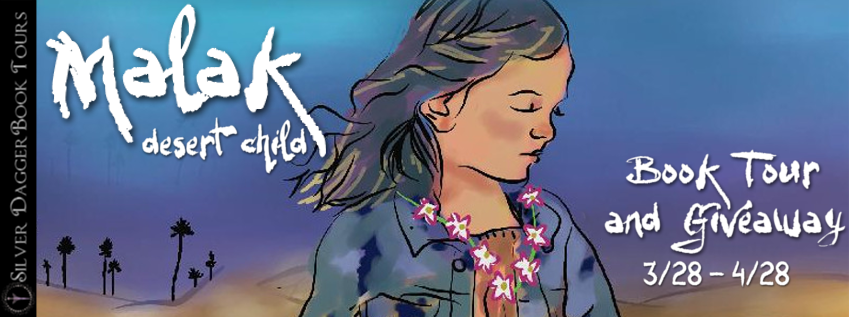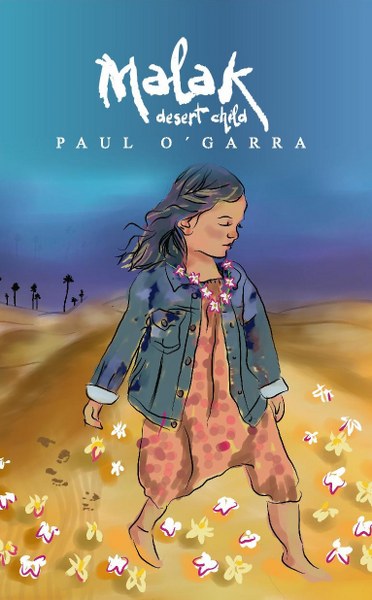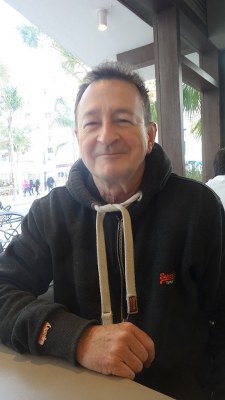Malak, Desert Child by Paul Ogarra Book Tour and Giveaway!
Malak,
Desert Child
The
Boy Who Sailed to Spain Book 2
by
Paul Ogarra
Genre:
Magical Realism Fiction
The
first time I saw her she melted the ice in my soul.
Malak
is a tiny beautiful five-year-old girl child. She lives in a cave in
dire poverty with her drunkard father and her Saharoui mother and
sister. Her enemies are all the towns children who victimize her and
her sister because of their race and condition. Her only friend is a
single mother named Latifa, and Malak´s grandmother Jeeda Hazzah who
dies of cancer.
But
Malak is the champion of her family against a violent father and the
children of the Zoco who she fights singlehandedly. This is a magical
and often mystical story of a young girl and the people she stumbles
upon, as she is rushed away by her uncertain destiny, to the land in
which her mother was born, the Sahara Desert. The unravelling of
Malak's story is also the unsnarling of the web of intrigue
surrounding the North of Africa, and it´s peoples and history, and
the reasons for many current dilemmas in this land of witchcraft and
mystery.
The
tale begins in earnest when a wandering ex-warrior happens on the
child and is struck by her magnificent courage and beauty. After a
significant episode with her drunken father and his cronies, having
interceded on the family´s behalf, he flees with them on a stolen
high-speed cruiser heading for Western Sahara and freedom. In the
course of their errant journey, they are taken into threatening
custody by the Algerian police. Malak´s personality and mystic
nature make of her the flux in an adventure which begins as a race to
return her to her maternal grandfather´s family. A flight of mercy
will become a race against time as Malak and her friends take on the
impossible. In this, they enlist the help of many tribespeople. Some
tribes known to all and others lost in the wastes of the mysterious
desert and the annals of history.The story comes to an emotional and
pent up conclusion in the least expected possible fashion.
**read
as a standalone**
As
he ate, he noticed the beautiful facial features of the child and her
long thick hair. Even though she was dressed in rags and dirty, her
face smeared and her hands black, the child was striking. She glanced
at the food, still attending to the baby, and even though she looked
away, her eyes wandered back to the overladen dish. Then she’d put
her chin out abruptly as an inward gesture, a self-correction, and
look elsewhere. She’s starving poor little cow, Pete
thought, but proud, amazing a five-year-old urchin with a
gutful of pride. “What
is her name?” He pointed at the child. “Malak”
she replied. “Her mother works, so she and her sister are on the
streets all day.” “So
what’s the problem with school?” “No
money.” She said something about him to the child, who turned and
looked at Pete. Her teeth were white and perfect, and her
smile entirely
unexpected in a face whose total lack of expression must have been
the child’s only weapon against the evil and negligence which was
happening around her, and which she instinctively knew was so, so
wrong. “Give
her couscous.” “No,
she will have what we leave.” So
he went to the other room and found a plate and a fork. He stacked
the big platter high with semolina and placed it before the
child, who fell on it like a wolf cub, using her hands to devour it
ravenously. He gave her bread and a Coke. “Malak!”
he said loudly, and she looked up but continued eating. “Tell her
to stop.” Latifa,
his friend, spoke sharply to her and the girl stopped and looked at
him. “She says she is sorry.” “She
has nothing to be sorry for, just tell her she will make me happy if
she uses the fork.” Latifa
spoke to her, and the
little girl listened attentively, humbly. Then she laughed, a peal of
heartfelt mirth, looking at him, and Pete, caught unawares, grinned
back in spite of himself. She ate the rest of the food with the
implement, experiencing some difficulty. As she ate, she kept looking
into his face and gently laughing.
Paul O´Garra was born in Gibraltar on the 8th May 1952. Paul and his three siblings were the children of schoolteachers and were reared with English discipline, immersed in romantic literature on the one hand, and a large local family of uncles, aunts, cousins and a doting grandmother, who was Spanish from Cadiz, on the other.
Childhood
was spent roaming across the Up South,
Rosia,
and Europa point areas of Gibraltar engaging in childish games and
adventures, reading extensively
books such as Enid Blyton’ adventure series, ‘Famous Five,’
‘Secret Seven,’
‘Swallows and Amazons Forever,’
John Buchan and the ‘Gorbals Die-hards.’
Saturday mornings were a day for avoiding the displeased grimaces of
monocled and
overweight
colonels, delving and searching through the shelves of the old
Garrison library to discover new horizons, characters,
and
stories. The journey of discovery that had begun with Baba the
Elephant eventually began to grow richer as the classics were
devoured.
In
1967, he looked on
as fellow students of Jewish persuasion prepare to leave for Tel Aviv
to defend Israel. Shortly after, the arrival
of General Moshe Dayan at the gates of Cairo, signaled to the world
that Israel´s direst moment had been
overcome. Paul, at the earliest time
possible,
set off in a steamer from Tangiers, sailing to Southampton.
After a spell in London,
he left the UK to discover his roots in Malta.
He alternated callings as a tour guide of Morocco and recoverer of
broken down rented cars in the desert, tour guide of south Spain and
eventually running a flamenco club on the Costa del Sol, in the days
when the Costa was still a new and exciting place to visit.
Eventually,
he set off again to discover new places in the Middle, the Far
East and the Philippines,
and when Perestroika and Glasnost finally arrived at the hands of
Mihail Gorbacheff and the Soviet Union was open, set off to discover
the East there. He studied Russian at St Petersburg and spent time
travelling to the Republic of Udmurtia, Kazan, Siberia and up an
uncharted river to meet Tribes that still lived in the area. Later to
Nizhny Novgorod and the South Volga, then to the
Ukraine travelling from city to city,
falling more and more in love with the great Russian writers and
painters as he went. Seventeen years ago at the age of fifty, Paul
contracted renal cancer.
He was operated on successfully at the Bullfighters Hospital in
Pamplona in North Spain. Metastasis was practically impossible the
surgeons happily reported. Two years later the
cancer metastasised to his lungs on which
he was duly operated,
and half of his
lungs were removed.
Later for reasons undefined he suffered strokes in both eyes and lost
partial sight in one eye and total in the left which he duly
recovered by swimming and praying. Seventeen years have gone by since
the renal cancer was first discovered,
and seven years since his last operation and everything is fine,
remission seems to be total.
Paul’s
still swims at least one or two kilometres per day all year round,
travels, practises martial arts and fervently believes that the Lord
leads him by the hand. After leaving the hospital
he spent some time in Tangiers, hairless, gaunt and on crutches, but
enjoying the warmth and affection of many new friends there. Then off
to Prague to study filmmaking, made several shorts but finally
decided that he would first write and then make movies when the time
came.
***GUEST POST***
Advice you would give
new authors?
Ask yourself honestly if
your work is good and exceptional. If the answer is no, don’t be
dismayed, just read more great authors and learn. If it´s yes, don’t
let anyone put you down, criticism is always healthy but a bit of
praise is also great.
Describe your writing
style.
Bizarre really, but in the
same way that I have a slight Gibraltarian accent when I speak, when
I write it comes through as well. So I would say that my style is
Gibraltarian.
What are they currently
reading?
If you mean what am I
currently reading, Tolstoy short stories, Dr Zhivago by Pasternak,
one in the morning and the other in the evening.
What is your writing
process? For instance do you do an outline first? Do you do the
chapters first? What are common traps for aspiring writers?
I
have tried everything and the best thing is to start at the front and
end at the back. One can of course write notes so as to remember
ideas for further along. I suppose I do an outline, in that I think
about it for days. The chapters just happen as the book progresses. I
suppose I would just find it somewhat disconcerting if I had
constructed a structure into which my story, which develops a life of
its own, must fit into. I suppose I´d be a real dunce as a
journalist. I think the worst trap is to expect a finished product at
once and forget to revise, revise and revise.
Do you try more to be
original or to deliver to readers what they want?
I write what I consider to
be good literature.
If you could tell your
younger writing self anything, what would it be?
Get on with it.
What’s the most
difficult thing about writing characters from the opposite sex?
I don’t consider there
to be a difference.
How long on average
does it take you to write a book?
How long´s a piece of
string, perhaps one year.
Do you believe in
writer’s block?
Sort of, No, not really.
Follow
the tour HERE
for exclusive content and a giveaway!









Comments
Post a Comment